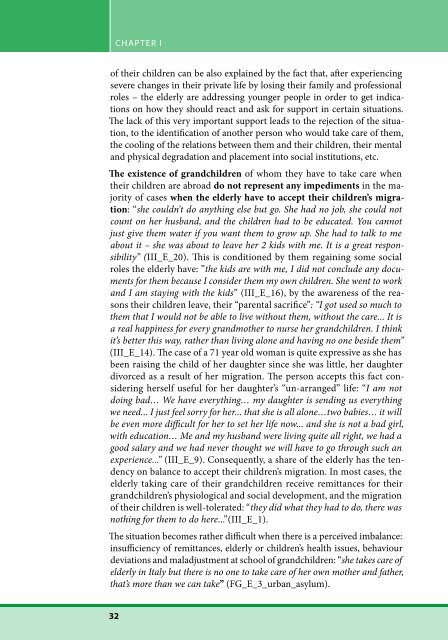specific needs of children and elderly left behind as a ... - IOM Moldova
specific needs of children and elderly left behind as a ... - IOM Moldova
specific needs of children and elderly left behind as a ... - IOM Moldova
You also want an ePaper? Increase the reach of your titles
YUMPU automatically turns print PDFs into web optimized ePapers that Google loves.
CHAPTER I<br />
<strong>of</strong> their <strong>children</strong> can be also explained by the fact that, after experiencing<br />
severe changes in their private life by losing their family <strong>and</strong> pr<strong>of</strong>essional<br />
roles – the <strong>elderly</strong> are addressing younger people in order to get indications<br />
on how they should react <strong>and</strong> <strong>as</strong>k for support in certain situations.<br />
The lack <strong>of</strong> this very important support leads to the rejection <strong>of</strong> the situation,<br />
to the identification <strong>of</strong> another person who would take care <strong>of</strong> them,<br />
the cooling <strong>of</strong> the relations between them <strong>and</strong> their <strong>children</strong>, their mental<br />
<strong>and</strong> physical degradation <strong>and</strong> placement into social institutions, etc.<br />
The existence <strong>of</strong> gr<strong>and</strong><strong>children</strong> <strong>of</strong> whom they have to take care when<br />
their <strong>children</strong> are abroad do not represent any impediments in the majority<br />
<strong>of</strong> c<strong>as</strong>es when the <strong>elderly</strong> have to accept their <strong>children</strong>’s migration:<br />
“she couldn’t do anything else but go. She had no job, she could not<br />
count on her husb<strong>and</strong>, <strong>and</strong> the <strong>children</strong> had to be educated. You cannot<br />
just give them water if you want them to grow up. She had to talk to me<br />
about it – she w<strong>as</strong> about to leave her 2 kids with me. It is a great responsibility”<br />
(III_E_20). This is conditioned by them regaining some social<br />
roles the <strong>elderly</strong> have: ”the kids are with me, I did not conclude any documents<br />
for them because I consider them my own <strong>children</strong>. She went to work<br />
<strong>and</strong> I am staying with the kids” (III_E_16), by the awareness <strong>of</strong> the re<strong>as</strong>ons<br />
their <strong>children</strong> leave, their “parental sacrifice”: “I got used so much to<br />
them that I would not be able to live without them, without the care... It is<br />
a real happiness for every gr<strong>and</strong>mother to nurse her gr<strong>and</strong><strong>children</strong>. I think<br />
it’s better this way, rather than living alone <strong>and</strong> having no one beside them”<br />
(III_E_14). The c<strong>as</strong>e <strong>of</strong> a 71 year old woman is quite expressive <strong>as</strong> she h<strong>as</strong><br />
been raising the child <strong>of</strong> her daughter since she w<strong>as</strong> little, her daughter<br />
divorced <strong>as</strong> a result <strong>of</strong> her migration. The person accepts this fact considering<br />
herself useful for her daughter’s “un-arranged” life: “I am not<br />
doing bad… We have everything… my daughter is sending us everything<br />
we need... I just feel sorry for her... that she is all alone…two babies… it will<br />
be even more difficult for her to set her life now... <strong>and</strong> she is not a bad girl,<br />
with education… Me <strong>and</strong> my husb<strong>and</strong> were living quite all right, we had a<br />
good salary <strong>and</strong> we had never thought we will have to go through such an<br />
experience...” (III_E_9). Consequently, a share <strong>of</strong> the <strong>elderly</strong> h<strong>as</strong> the tendency<br />
on balance to accept their <strong>children</strong>’s migration. In most c<strong>as</strong>es, the<br />
<strong>elderly</strong> taking care <strong>of</strong> their gr<strong>and</strong><strong>children</strong> receive remittances for their<br />
gr<strong>and</strong><strong>children</strong>’s physiological <strong>and</strong> social development, <strong>and</strong> the migration<br />
<strong>of</strong> their <strong>children</strong> is well-tolerated: “they did what they had to do, there w<strong>as</strong><br />
nothing for them to do here...”(III_E_1).<br />
The situation becomes rather difficult when there is a perceived imbalance:<br />
insufficiency <strong>of</strong> remittances, <strong>elderly</strong> or <strong>children</strong>’s health issues, behaviour<br />
deviations <strong>and</strong> maladjustment at school <strong>of</strong> gr<strong>and</strong><strong>children</strong>: “she takes care <strong>of</strong><br />
<strong>elderly</strong> in Italy but there is no one to take care <strong>of</strong> her own mother <strong>and</strong> father,<br />
that’s more than we can take” (FG_E_3_urban_<strong>as</strong>ylum).<br />
32

















